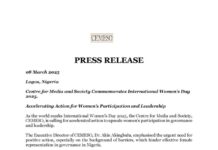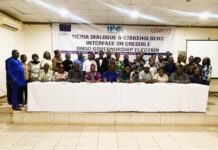National interest. Public interest. These two familiar but seemingly ambiguous concepts were what engaged the attention of journalists who attended a media workshop in Katsina recently.
For several hours during the workshop, the resource persons, including Prof. Hussein Tukur of the Nasarawa State University, and Kingsley Macebuh, a Professor of Theoretical Politics from New York University, participants and facilitators, embarked on a search for the definitions of “national interest” and “public interest” in the context of media reportage of activities of bandits, insurgents and kidnappers.
In a number of cases, following the activities of insurgents and armed bandits, government and even some citizens turn the heat on the media, accusing them of various forms of misdeed or alleging misrepresentations in the course of reporting and publishing or broadcasting those incidents.
And, for Katsina in particular, the search for the proper definitions of “public interest” comes in the face of recurrent killings of citizens across the state due to activities of bandits, cattle rustlers and kidnappers.
The Nonviolent Peace Institute, in collaboration with Absolute Press, organised the programme tagged ‘Capacity building workshop for journalists,’ with the theme, ‘News reporting for national stability.’
Identifying the media as critical stakeholders in national development, the Secretary to the Katsina State Government (SSG), Dr. Mustapha Muhammed Inuwa, frowned at certain anomalies in the media coverage and reportage of the murderous activities of criminals and other security issues in the state. Inuwa appealed to journalists to ensure they discharge their duties within the boundaries of reason and moderation while urging participants at the workshop to strive to become reporters of conscience with ardent desire and drive for responsible journalism.
Said the SSG: “As we are all aware, the security situation in Katsina State has of recent been a topical issue, attracting wide publicity in both local and national media. This state has had its negative share of criminal activities comprising armed banditry, cattle rustling and kidnapping for ransom, especially in the eight frontline local government areas bordering the Rugu forest. While the state and federal governments and security agencies strive to contain the situation, their efforts, however, get overshadowed by reports that tend to place more emphasis on the atrocities committed on communities by the criminals.”
Whatever the arguments, for residents in parts of Jibia, Batsari, Safana, Dan-Musa, Kankara, Faskari Dandume, and Sabuwa, the stark reality is that life and living have virtually turned nightmarish as bandits, kidnappers and cattle rustlers carry out their inglorious trade in the areas, almost on daily basis. In some instances when the bandits choose to exhibit uncommon compassionate disposition, they spare the lives of the people but chase entire communities out of their homes and set their houses and other property ablaze. They would then walk away.
On other occasions, they invade communities, riding on as many as 300 motorcycles. They will confiscate available foodstuff from residents, rustle some cattle, abduct some of the residents and then disappear into the neighbouring forest. Yet, in certain cases, the attacks are often vicious with an alarming number of deaths, as the hoodlums simply descend on target communities and shoot at anything and everything on sight. The attackers would then retreat, leaving behind trails of blood.
Help from the security agencies during these attacks has remained elusive in the farming communities with no infrastructural facilities like accessible roads, good houses, potable water, and other essential services.
The bandits have since designed another strategy to make it even more difficult for the people to get help when under attack.
Recently, they demobilised an Armoured Personnel Carrier vehicle on a rescue mission at Safana Local Government Area of the state. A soldier and an operative of the Nigeria Security and Civil Defence Corps on the team were injured in the ensuing gun duel. Police Public Relations Officer, Gambo Isah, said the attack frustrated efforts of the security personnel who were on their way to Kirtawa where some of the bandits invaded the village, killed 10 residents and rustled an unspecified number of cattle.
In another development, the bandits waylaid a security team at Kankara Local Government area, killing a policeman and injuring four others. The policemen were responding to distress calls from the Dan-Sabau community but before they got there, the bandits had killed 17 villages and fled into the Rugu Forest.
Kidnappings are reportedly more prevalent in parts of Kankara and Jibia, perhaps given their proximity to highways linking Katsina, Kaduna and Zamfara states and the massive stretch of uninhabited areas. The kidnappers apparently exploit the situation to mount illegal checkpoints from where they abduct unsuspecting motorists and commuters.
While motorists have since abandoned the Jibia Road to Kaura Namoda in Zamfara state, the alternative route from the southern axis of Katsina town – the stretch from Kakumi junction in Kankara Local Government, to Sheme, near Gusua – is described as the “most dangerous spot,” especially for motorists travelling between dusk and in the early hours of the morning.
In April, Governor Aminu Bello Masari had described Katsina as being under siege. At an extra-ordinary security meeting at the Government House, he had said: “No one, including myself, is safe. I am not safe.”
He ranked armed banditry, kidnapping, cattle rustling, and armed robbery as major challenges in the state.
Armed banditry and related acts of criminality are not entirely new in Katsina. The most devastating was the killing spree of March 12, 2014. During a state visit by then former President Goodluck Jonathan, suspected cattle rustlers slaughtered some 142 residents in three communities of Mararrabar Maigora, Sabon Layin Galadima, and Unguwar Doka, all in Faskari Local Government area. The Katsina State chapter of the Myetti Allah Cattle Breeders Association of Nigeria estimates that no fewer than 3,000 members of the local vigilante groups across the state lost their lives in three years due to the activities of the cattle rustlers while the number of the civilian casualties is believed to be even higher.
But the Masari administration, on assumption of office in 2015, intervened, crushing the menace with an amnesty programme which saw repentant cattle thieves dropping their arms and embracing the dialogue option. The programme had facilitated the release of over 117 suspected cattle rustlers who were being held by the security agencies.
“Some of the agreements reached were that they will renounce their acts completely, return their arms and ammunition and rustled animals while the government will release some of their members, provide clinics, schools and dams for them,” the government announced.
But indications suggest that some four years on, that initiative might have since hit the rocks with the resurgence of the menace. Again, Masari had used the occasion of the swearing-in ceremony for his second term in office, on May 29, to lament the development.
The government had said: “As we are all aware, the state has of the recent witnessed disturbing resurgence of incidences of armed banditry and kidnapping for ransom, more prevalent especially in the front line local government areas bordering the Rugu forest, despite government’s continued unflinching logistics support to the security agencies in the state. Our towns and villages in those areas have become prone to a new dimension of armed bandits attacks, leading to the killing and maiming of innocent citizens, carting away their foodstuff and burning down other belongings of economic value including houses, vehicles, shops and traditional silos. Kidnap incidences, on the other hand, have permeated all the strata of the society, as the rich and poor, religious and traditional rulers have become victims.”
Katsina is one of the few states in the north that has remained free from the Boko Haram infestation. Emir of Katsina, Alhaji Abdulmumini Kabir Usman once said: “Katsina is the most peaceful state in Nigeria and this is because of the capacity of the Katsina people to embrace and accommodate all persons from all parts of the country, irrespective of tribal or religious origins.”
But with criminals having found Katsina a fertile ground for armed banditry, cattle rustling and kidnapping, the tag of the “most peaceful state” might have taken flight from the area, at least for now.
Hassan, in his presentation entitled, ‘Security and responsible journalism in Nigeria,’ opined that there might never be holistic definitions for the terms, national security, national interest, and national development. He described them as troublesome concepts, especially when their perceived meanings are in conflict with self-imposed definitions which government and its agencies promote.
Hassan said given the acclaimed power of the press in the society, “politicians of various persuasions believe in taming it, or at least, bring it under their control, in order to manipulate it, to project and protect their power and influence.”
The Chief Executive Officer of Absolute Press, Emeka Nwamkpa, explained that the workshop was organised to build media capacity of participants in reporting current security challenges in Katsina State as well as to promote patriotism and professional excellence among practising journalists in the area.
“This effort is about the need for a deeper understanding of the subject in reporting security matters without hampering the collective safety of Nigerians and not compromising national security,” Nwampka said.
In a communiqué at the end of the programme, participants urged journalists to refrain from presenting reports of acts of violence, banditry, and terrorist activities in a manner that may tend to glorify such acts in the eyes of the general public.
The communiqué, signed by Alhaji Bashir Bello, said: “Government should strive to prioritise the provision of social welfare services including functional education, health, employment, and potable water for citizens.”
















